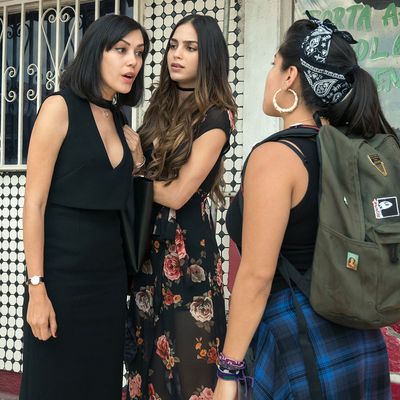
In the second scene of the new Starz drama-comedy Vida, a woman dies. The sequence is shot hauntingly, both the character and viewers instantly aware that something serious is about to happen. She collapses, blood pouring out onto the white tile of a bathroom, the striking aerial shot becoming the seriesÔÇÖs first title card. This is Vida, a show so instantly sure of itself in its very first moments.
Vida stars Melissa Barrera and Mishel Prada as Lyn and Emma, two polar-opposite Chicana sisters who reluctantly return to their neighborhood on the east side of Los Angeles in the wake of their motherÔÇÖs death, as depicted in that catalyzing early scene. The sistersÔÇÖ fraught dynamic is established right away, with Lyn asking Emma if their motherÔÇÖs death can please override her ÔÇ£cuntinessÔÇØ for a bit. The pilot then takes them through the funeral, shot austerely, a glimmer of the good parts of the sistersÔÇÖ relationship peeking through in the form of their clasped hands. From there, they go to the reception, held in the bar their mother Vidalia owned with Eddy (Ser Anzoategui, who uses they/them pronouns), a roommate Emma never knew about. Emma eventually storms out, Lyn hooks up with an ex, and they both learn that Eddy wasnÔÇÖt just a roommate and business partner. She was VidaliaÔÇÖs wife.
From the start, VidaÔÇÖs visual storytelling is immersive. The camerawork is reminiscent of Friday Night Lights ÔÇö lots of close-ups on hands, bobbing shots with so much movement to them that the camera feels emotionally tethered to the narrative. At the reception, the camera follows a child as he runs through the crowd with a plate of food. It also languidly follows Lyn as she makes her way out of the busy bar and down to the cellar, feebly pretending she doesnÔÇÖt know exactly what sheÔÇÖs chasing: her ex Johnny (Carlos Miranda).
In the cellar, Lyn breaks down, and then Johnny goes down on her, the transition hilariously jarring yet expected all at once. She makes an off-hand comment about his ÔÇ£baby mamaÔÇØ upstairs ÔÇö a woman named Carla whom Lyn not-so-fondly remembers used to call her ÔÇ£Abercrombie and bitchÔÇØ in school ÔÇö and the rosy light of their funeral hookup fades fast. ItÔÇÖs clear thereÔÇÖs a long history between the two. Vida wastes no time in setting up its character dynamics, its voice, its fully compelling and grounded visuals.
Meanwhile, EmmaÔÇÖs outside, meeting one of the human faces of the seriesÔÇÖs true villain, gentrification. Nelson is a developer, and itÔÇÖs clear from the way he talks about the neighborhood, asserting that heÔÇÖs part of it while also welcoming change, that he doesnÔÇÖt have the barÔÇÖs best interests in mind. After all, he shows up at a funeral to hand a business card to the daughter of the dead ÔÇö thatÔÇÖs not exactly something a good guy does.
Eddy warns Emma about Nelson at episodeÔÇÖs end, but she doesnÔÇÖt want to hear it. SheÔÇÖs still reeling from the revelation that her mother married a woman. Twice, she calls her mom a hypocrite, something Lyn wonders about and the show leaves to unravel later. But the implication is pretty obvious: Emma is probably queer, and her mother probably didnÔÇÖt approve. We already know she and her mother had a rocky relationship, another dynamic thatÔÇÖs established right away without feeling like heavy-handed exposition. Vida makes great use of the old adage ÔÇ£show, donÔÇÖt tell,ÔÇØ weaving a dynamic and layered pilot without just being an info dump. ItÔÇÖs fittingly full of life.
Its comedic voice comes through right away, too. The very first scene introduces us to Marisol (Chelsea Rendon), the supercharged vlogger who has made fighting the gentrification of her neighborhood her foremost mission. Rendon harnesses MariÔÇÖs tirades against colonialism and appropriation with a fierce energy thatÔÇÖs tinged with comedy, even though MariÔÇÖs passion is definitely sincere. Confronting a white reporter filming a video outside a neighborhood restaurant, Mari calls her a ÔÇ£Warby Parker bitch.ÔÇØ
Barrera also gets some funny line readings in: At the reception, when Emma observes that no one wants to say hi to her anyway, Lyn quips, ÔÇ£ThatÔÇÖs probably true.ÔÇØ In an altercation between Emma and Mari ÔÇö who accuses the sisters of being ÔÇ£whitetinasÔÇØ ÔÇö Mari says she remembers Emma ÔÇ£used to walk around here all bougie and stuck up and shit,ÔÇØ and Lyn says, dryly, ÔÇ£Yep, thatÔÇÖs her.ÔÇØ
Emma remains stoic throughout the pilot, resistant to letting people from her past back in, staunchly stuck-up about her surroundings, making a snide comment about people still ÔÇ£stuckÔÇØ in her neighborhood. But her grief pulsates just under the surface throughout, finally bursting forward when she joins Lyn in watching a home video of them as girls, dancing with their mother. ÔÇ£Welcome the fuck home,ÔÇØ Lyn says earlier, after their run-in with Mari (who, by the way, is JohnnyÔÇÖs younger sister). VidaÔÇÖs instant sense of place has that specific, complicated feeling of home.

